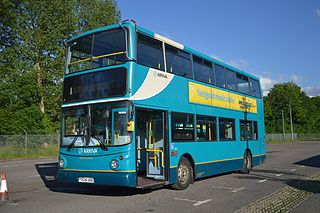
The Volvo B9TL is a low-floor double-decker bus built by Volvo from 2002 until 2018. It superseded the Volvo Super Olympian and the Volvo B7TL. The 2-axle version has been superseded by the Volvo B5TL in 2014 and the 3-axle version has been superseded by the Volvo B8L in 2018.

Wrightbus is a Northern Ireland based bus manufacturer and a pioneer of the low-floor bus. The company was established in 1946 by Robert Wright and was run by his son William Wright.

The Volvo B7TL is a low-floor double-decker bus chassis which was launched in 1999 and replaced the 2-axle version of the Volvo Olympian. It was built as the British bus operators seemed hesitant to purchase the B7L double decker with a long rear overhang.

The VDL DB250 is a twin-axle double-decker bus chassis that was manufactured by VDL Bus & Coach.

The Wright Eclipse Gemini is a low-floor double-decker bus body that was built by Wrightbus between 2001 and 2019, based on the single-deck Wright Eclipse design. The second-generation Eclipse Gemini 2 was launched in 2009, followed by the third-generation Gemini 3 in 2013. Additionally, the body was available on Volvo Super Olympian chassis in Hong Kong between 2003 and 2005, marketed as the Wright Explorer. Production of the Gemini have been suspended as Wrightbus entered administration in September 2019.

The VDL SB120 was a low floor light-weight midibus produced from 1999 by VDL Bus & Coach of the Netherlands primarily for the United Kingdom market.
Operation Overdrive is the name of a series of improvement programmes carried out by Arriva in their UK bus operations. The original Operation Overdrive was done by Arriva Southern Counties in the Medway Towns (Kent) in 2004, with further operations occurring in Maidstone (Kent), Merseyside, Leicestershire, County Durham, and Southend-on-Sea (Essex).

The Wright Pulsar Gemini was a type of double-decker bus body built on the VDL DB250 by Wrightbus between 2003 and 2006. It was almost identical to the Wright Eclipse Gemini that was mounted on the Volvo B7TL chassis.

The Wright Electrocity was a type of hybrid electric bus built by Wrightbus between 2002 and 2013. The Electrocity was based on DAF/VDL SB120 chassis for most of these buses, except for a single Dennis Dart SLF prototype.

The Wright Pulsar was a single-decker bus body built on the VDL SB200 single-decker bus chassis by Wrightbus between 2006 and 2014.
Wright Gemini, a generic name for a style of low-floor double-deck bus bodywork built by Wright may refer to:

The Wright Commander was a low-floor single-decker bus body built on the DAF/VDL SB200 chassis by Wrightbus between 2002 and 2007.

Arriva North West is a bus operator running services in North West England. It is a subsidiary of Arriva UK Bus.

The Wright Gemini 2 was a double-decker bus built by Wrightbus between 2007 and 2013. It was announced in December 2007 but was not named until 2008. It was constructed as a semi-integral vehicle, with VDL DB300 chassis modules. The bodywork utilised some lighter materials so that the vehicle was lighter than the Eclipse Gemini and Pulsar Gemini bodied buses. It was available in two versions; the Gemini 2 DL diesel-powered version, and the Gemini 2 HEV diesel-electric hybrid version.

The Volvo B5LH is a low-floor hybrid electric bus chassis for both single-decker buses and double-decker buses manufactured by Volvo since 2008. It is the basis for Volvo's integral 7700 Hybrid full low floor city bus and its successor, the 7900 Hybrid from 2011. In 2008, pre-production batches of both types of chassis were manufactured. Serial production started in June 2010. From 2013 it is also available as an articulated bus chassis. First entering service in London, the B5LH is the only current double decker type in service in the United Kingdom that uses a parallel hybrid drive system.

The Wright StreetLite is a low-floor midibus introduced by Wrightbus in 2010. It was originally available in only one body style before the door forward and StreetLite Max variants were introduced in 2011 and 2012 respectively. Production of all variants of the StreetLite have been suspended as Wrightbus entered administration in September 2019.

There are 3,669 hybrid buses, 155 electric buses, and ten hydrogen buses operating in London, as of March 2019, out of a total bus fleet of 9,142. The first hybrid bus was introduced on route 360 in March 2006 and over 300 were in passenger service by July 2012. The world's first double-decker hybrid bus was introduced in London from January 2007. Transport for London initially stated that it intended to make all new buses delivered for use in London hybrids from 2012. This requirement was later dropped.

The Scania OmniDekka is a double-decker bus built for sale in the UK market, introduced in 2003. Originally built on Scania N94UD chassis at Euro 3, and later Scania N230UD and N270UD at Euro 4 and Euro 5, the bodywork consists of a modified East Lancs Myllennium double decker, but with the standard front end cowl and windscreen replaced with that of Scania's own integral OmniCity.

The Volvo B5TL is a 2-axle low-floor double decker built by Volvo. It replaced the B9TL as Volvo's Euro 6 2-axle double decker product for the UK and Irish markets.

The Wright StreetDeck is an integral double-decker bus that was manufactured by Wrightbus between 2014 and 2019, built as standard with a Daimler OM934 diesel engine. Hybrid-electric, full-electric and hydrogen-powered variants were also produced before production was suspended due to Wrightbus entering administration in September 2019.


















